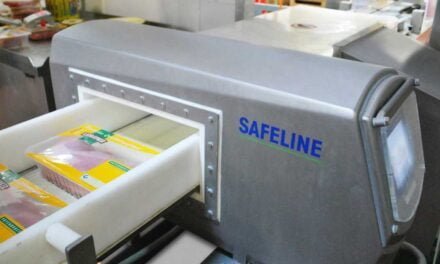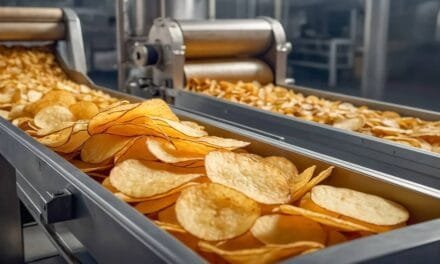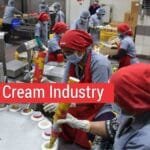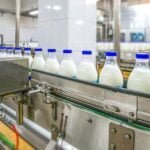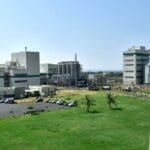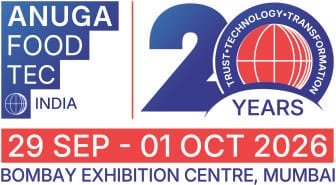Maintaining high sanitary standards in the food industry is critical for operational integrity and compliance. Fahad Javaid explains the importance of maintenance of food processing equipment to uphold the highest hygiene and food safety standards in diverse processing areas.
Food processing, more than most other industries, requires the highest level of cleanliness. One of the key ways of doing that is by always maintaining sanitary equipment and conditions at all times. Whether we’re talking about cooking, heating, storage, packaging, safety, or any other type of food processing equipment, it is essential to clean anything that may come in contact with food regularly.
Yet, this is still a big challenge for many producers – it can be costly, ineffective, and time-consuming if you don’t learn the best ways to optimize the cleaning and maintenance of food processing equipment. This article will delve into the importance of cleaning equipment regularly and go through some strategies to employ for cleaning equipment more effectively.

Importance of Maintenance and Cleaning for Equipment Longevity
Beyond the aforementioned and critical aspect of food safety, maintenance and cleaning also play a pivotal role in ensuring equipment longevity and optimal performance in food processing. From ovens and refrigeration units to slicers, grinders, and dishwashers, the equipment used in food processing areas is a significant investment for any business. Here’s why maintaining and cleaning this equipment is essential:
Preventing Breakdowns: Regular maintenance and cleaning prevent equipment breakdowns. Neglected equipment is more likely to malfunction, leading to costly repairs or replacements. Routine cleaning removes food residues and debris that can clog or damage sensitive components.
Optimizing Efficiency: Well-maintained equipment operates at peak efficiency. In the food industry, where energy costs can be substantial, efficient equipment can significantly reduce operational expenses. Proper maintenance ensures that equipment runs smoothly and performs its tasks as intended.
Extending Lifespan: Regular cleaning and maintenance can extend the lifespan of equipment. This is crucial for cost control in an industry where equipment replacement can be a significant expense. It’s a wise investment to protect the longevity of your equipment.
Enhancing Food Quality: The last thing you want is for your equipment to introduce unwanted elements into your culinary creations. This means better food quality, which is essential for customer satisfaction. Quality equipment maintenance is an investment in the reputation of your business.
Regulatory Compliance: Many health and safety regulations require the regular maintenance and cleaning of equipment. Non-compliance can result in fines or, in some cases, even business closure. Staying up to date with maintenance and cleaning routines ensures you meet these legal requirements.
Reducing Downtime: A broken or malfunctioning piece of equipment can lead to costly downtime. In the rhythmic flow of the food industry, every minute counts. By minimizing breakdowns, you’re not just maintaining momentum; you’re delivering reliability to your customers.
Safety Considerations: In addition to ensuring the food’s safety, well-maintained equipment is also safer for the staff operating it. Faulty equipment can pose risks, such as electrical hazards or injury from malfunctioning parts.
Resale Value: If you decide to upgrade your equipment or change your business, well-maintained equipment has a higher resale value. It’s not just about protecting your current investments; it’s also about future-proofing your financial stability.
How to Ensure Food Processing Equipment Longevity
You can do many things to keep your kitchen equipment running smoothly while also upholding essential hygiene standards. For more technical appliances, there may be more steps involved in the cleaning and sanitizing process to ensure longevity, but in general, here are some guidelines to keep in mind:
- Follow manufacturer recommendations for maintenance schedules and cleaning procedures. These guidelines are designed to maximize the lifespan of your equipment.
- Train your staff on proper equipment cleaning and maintenance protocols to ensure consistency and effectiveness.
- Keep detailed records of equipment maintenance and cleaning. This helps track trends and anticipate issues before they become critical.
- Regularly inspect equipment for signs of wear and tear and address issues promptly. Preventative maintenance is more cost-effective than reactive repair.
- Consider investing in professional maintenance services for complex equipment or as part of a routine preventative maintenance plan.
- Dedicate a schedule to cleaning and sanitizing practices. Map out daily, weekly, monthly, and bi-annual tasks and allocate proper time and resources to ensure these tasks are completed properly.
Maintaining and cleaning your equipment is not just a good practice; it’s an investment in the long-term success of your business. It ensures your equipment remains efficient, safe, and compliant with regulations while also reducing the risk of unexpected breakdowns and costly downtime. By prioritizing equipment maintenance and cleaning, you safeguard your reputation and bottom line.
Using Technology and Innovations in Cleaning Tech
In today’s fast-paced and increasingly demanding food industry, the adoption of modern cleaning technologies has become imperative for maintaining the highest standards of hygiene. These innovations streamline the cleaning process and enhance the effectiveness of your equipment.
Automation: Automation is one of the cornerstones of modern cleaning technologies. With the integration of automated systems, routine cleaning tasks can be carried out more consistently and efficiently, reducing the margin for human error. Automated cleaning equipment, such as conveyor belt cleaners, robotic cleaners, and automated disinfection systems, allows for a thorough and systematic approach to sanitation. These systems can operate outside of regular working hours, minimizing disruption to production schedules.
Digital Tools and Software: Digital tools have also revolutionized the way cleaning plans are managed and monitored. Cutting-edge software and applications provide real-time tracking of cleaning activities, enabling managers to ensure that cleaning schedules are adhered to, and critical control points are consistently addressed. These digital tools can generate detailed reports, helping to identify trends and areas that may require additional attention. Moreover, they facilitate communication and coordination among cleaning staff, supervisors, and management.
These innovations are not limited to the hardware and software alone. Advances in cleaning materials, including more effective disinfectants, antimicrobial coatings, and biodegradable cleaning agents, have further improved the hygiene standards in the food industry.
Future Trends in Hygienic Food Processing Equipment Maintenance
The food industry continues to evolve, and with it, the technology and approaches used in hygienic maintenance. As we look to the future, several exciting trends are on the horizon.
Nanotechnology: anomaterials and coatings are being developed to create self-cleaning surfaces. These surfaces can repel contaminants, making them easier to clean and reducing the need for harsh chemicals.
IoT (Internet of Things): The integration of IoT devices in food processing areas is becoming increasingly prevalent. Sensors and smart devices can monitor cleanliness, temperature, and humidity, providing real-time data for better decision-making. Predictive maintenance, where equipment issues are detected before they lead to a breakdown, is also becoming more common.
UV-C and Plasma Cleaning: Ultraviolet-C (UV-C) and plasma technologies are harnessed to kill surface bacteria and viruses. These methods offer a chemical-free, environmentally friendly alternative to traditional disinfection.
Keeping your equipment clean and properly maintained is valuable for every food processing operation because it will help you work longer and more efficiently. A big part of cleaning optimization is staying abreast of ongoing technology updates in the food processing industry and proper equipment training and inspection schedules. Clean equipment is happy equipment, so do your best to optimize your food processing cleaning operations in 2024.
Fahad Javaid, is an accomplished professional with a distinguished career in the Food Equipment Services industry. He is the General Manager of Operations at Zanduco, Canada, a well known name in kitchen equipment industry.



